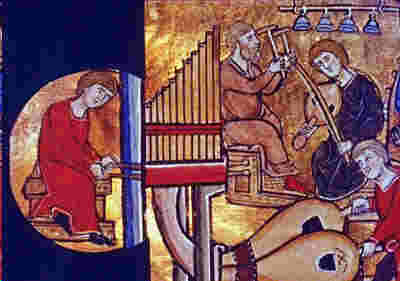

|
| ||||||||||||||||||||||||||||||||||||||||||||||||||||||||
|
||||||||||||||||||||||||||||||||||||||||||||||||||||||||
|
| ||||||||||||||||||||||||||||||||||||||||||||||||||||||||

Welcome to the world of operaThe Muse of Music welcomes you to the World Of Opera. Ah, Opera, the fusion of all the arts! Where would music be without you? About operaNo, we're not talking about the plural of opus, although opus and opera are closely related. We're talking about one of the most important branches of music. As words go, an opus is a creative work, especially a musical composition, numbered to designate the order of a composer's works. The word is derived from the Latin stem oper-, meaning to work, or a work. From there it's only a baby step to the kind of opera we're dealing with, a creative work, especially a musical composition. Take one more baby step and you're there. An opera is a particular kind of extended dramatic composition in which all parts are sung to an instrumental accompaniment. An opera always incorporates the elements of drama; you might say that opera is a drama set to music. An opera usually includes singing (song, aria, recitative, chorus, etc.), acting, speech and language (lyrics, dialogue, narration, dialogue, or just plain talking and speaking, etc.), sometimes ballet, with symphonic instrumentation that sometimes accompanies the other forms, sometimes stands alone. Understandably, The Muse of Music is primarily interested in those aspects of the Dance that emphasize music. Opera is sometimes described as the fusion of all the arts because it embodies most or all of these art forms. In addition, most operas are performed with the aid of painted, constructed sets, lighting, and costume design; and many make use of objects of art as props. Because so much goes into an operatic performance, some aficionados regard opera as the highest art form. Most operatic performers regard it as the most demanding of the performance arts. Broadly, there are two operatic fields or genres, two kinds of opera:
Most operas written prior to the 20th century fall into one or another of these two categories. As we have seen in other fields of music, the 20th century saw many innovations. Although today's operas embody many of the elements of their predecessors, newly composed operas are generally written in any style the composer deems appropriate. You might say that today's operas are written in free style. scopeThe Muse Of Music will explore operatic history, development, forms, terminology, performers and performances, and many other aspects of opera in the pages that follow. Of course, The Muse's emphasis will be on the musical aspects. When other muses are involved—The Muse Of Language Arts for drama, The Muse Of Fine Arts for stage design, etc.—the responsibility for the exploration will be shared as appropriate. AvailabilityThese pages are in the initial stages of development. Return periodically for future additions. ETAF Recommends...Coming.
Search this web site with Electricka's Search Tool:
tap or click here
Electricka's Theme Products
Shop At Cafe Press
This web site and
its contents are copyrighted by
Decision Consulting Incorporated (DCI).
All rights reserved. |
| |||||||||||||||||||||||||||||||||||||||||||||||||||||||